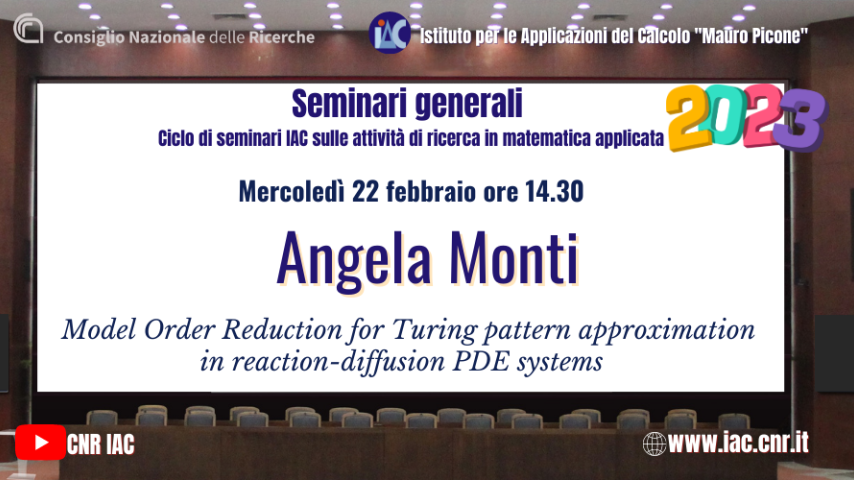
Mercoledì 22 febbraio il nuovo appuntamento con i seminari generali dell'IAC.
Ospite è Angela Monti, assegnista dell'IAC presso la sede di Bari.
Titolo del seminario: Model Order Reduction for Turing pattern approximation in reaction-diffusion PDE systems
Abstract
We investigate a suitable application of Model Order Reduction (MOR) techniques for the numerical approximation of Turing patterns, that are stationary solutions of reaction-diffusion PDE (RD-PDE) systems. We will consider in particular the Proper Orthogonal Decomposition (POD) and the Dynamic Mode Decomposition (DMD). Both techniques present inaccurate approximations, therefore we will introduce two novel algorithms that aim at stabilizing the studied problem. In the first part of the talk we focus on the stabilization of the POD-DEIM technique. We show that solutions of surrogate models built by classical POD-DEIM exhibit an unstable error behaviour over the dimension of the reduced space. To overcome this drawback, we add a correction term that provides missing information to the reduced model and we apply the POD-DEIM technique to the corrected model. To further improve the computational efficiency, we propose an adaptive version of this algorithm in time that accounts for the peculiar dynamics of the RD-PDE in presence of Turing instability. We show the effectiveness of the proposed methods in terms of accuracy and computational cost for a selection of RD-PDE systems, i.e. FitzHugh-Nagumo, Schnakenberg and the morphochemical DIB models, with increasing degree of nonlinearity and more structured patterns. In the second part we show some preliminary results regarding a new adaptive algorithm based on Dynamic Mode Decomposition (DMD). DMD is a data-diven technique that allows to find the best linear fit for a given dataset. We propose to modify the method by splitting the time interval into several subintervals to keep a certain level of accuracy. Numerical results will show the efficiency of the shown method. This is a joint work with Alessandro Alla (Università Ca’ Foscari, Venezia) and Ivonne Sgura (Università del Salento, Lecce).







